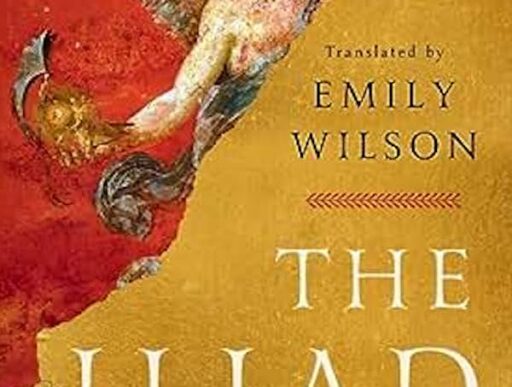I’ve always preferred The Odyssey to The Iliad—preferring adventurous peace to adventurous war. But when I heard good things about Emily Wilson’s new translation of The Iliad, I decided to buy it. I wasn’t sorry.
The first decision for any translator of Homer is what meter to use. Homer’s is dactylic hexameter, which is awkward in English. After playing with various meters, Wilson chose iambic pentameter, because (as she explains in her Translator’s Note) it “could echo a centuries-long poetic tradition in English, just as the original’s dactylic hexameter echoes a centuries-long poetic tradition in Greek”—and also because iambic pentameter “invites reading aloud” (important for a poem born out of an oral tradition).
So, for The Iliad’s famous opening words—
Menin aeide thea Paleiadeo Achileos Oulamenain
—which literally translate as
Wrath sing goddess of Peleus’ son Achilles destructive
—Wilson gives us
Goddess, sing of the cataclysmic wrath of great Achilles, son of Peleus
But the poetry of Wilson’s Iliad goes well beyond the meter. There’s occasional internal rhyming. The god Poseidon “shakes and quakes the earth.” In battle, “helmets clattered, battered by the stones.” After the Greek warrior Diomedes speaks, Nestor “heard and concurred.”
Wilson’s most frequent poetic technique, though, is alliteration. Most of it comes in battle scenes—but probably that’s just because the bulk of The Iliad is descriptions of battles. Here’s a sample:
“The Greeks and Trojans clashed / in bitter battle, aiming bronze-tipped spears.”
“Danger was everywhere, pain piled on pain.”
The Greek Menelaus comments that Trojan “Hector has / the force of fearsome fire.”
“Aeneas first came forward, full of menace / his heavy helmet bobbing on his head.”
Hector jumped down from his chariot and “woke the deadly din of war.”
Achilles stands on his ship “to watch the agonizing work of war.”
The Greek Patroclus “rushed ahead / through the front line of fighters—like a falcon.”
Achilles foresees that “death and strong destiny will come for me” and says to his enemies: “Despite all that, you Trojans have to die / by dreadful deaths.”
Hector is “fixed in his firm intent to fight Achilles”; but after Achilles strikes him, Hector is “faint and feeble.”
“Achilles, with his spirit dressed in daring, / dashed at the Trojans with a dreadful cry.”
When Zeus holds up his scales during Achilles’ chase of Hector around Troy, “down the destined day of Hector sank.”
Plus there are the many lines using hard “C” sounds to evoke the clamor of war fought with spears and shields:
“Their shields collided and the metal bosses / clanged in cacophony.”
“Hides clashed, spears struck, and human wills collided” as shields “smashed together and created / great rattling clangs and cracks and thunderous noise.”
When Achilles traps some of the Trojans in the Scamander River, the river complains “My lovely streams have been clogged up with corpses.”
I find Wilson’s alliteration (and there is much more) delightful. It reminds us that poetry is more than meter, more even than occasional rhyme. It gives The Iliad a fresh and lively feel.
For freshness, Wilson also made the decision to use contemporary words where appropriate. So we have, for instance, the Greeks calling Thersites “that rude windbag” and Odysseus addressing him as “You blabbermouth.”
Later, “Achilles’ men / were traipsing round the camp,” and Agamemnon and Menelaus are “hankering for battle.”
Hector’s baby son “wiggled back to snuggle” in his nurse’s lap, is “cuddled” by Hector, and is then “snuggled” again—this time by his mother.
Zeus hugs his daughter Artemis “with a chuckle” after she’s been beaten up by Hera.
Paris doesn’t “dawdle long” before arming himself for battle.
One Ajax says to the other that he’s “itching for a fight”; the other responds “my feet are fidgeting and keen to run.”
The Greeks are “flabbergasted” after listening to Achilles scorn Agamemnon.
The Greek Diomedes (responding to Paris’ mocking of him) calls Paris “You good-for-nothing archer! Sleazy flirt!”
The Trojans “whooped triumphantly” after Hector makes a kill.
Apollo to Poseidon on humans’ pitiful mortality, since after a short time they “shrivel up” and die.
Menelaus addresses Athena (disguised as Phoenix): “Phoenix, father, grandpapa, papa.”
And many people are called “Poor fool!”: Patroclus (twice by narrator); Hector (by Zeus); Achilles (by narrator); Aeneas (by Poseidon); Hector’s wife (by narrator‚ because she’s preparing a bath for Hector’s return, though we know he’s already dead).
So all in all, I’d say that Wilson’s translation is a perfect balance between common speech and the grandness appropriate for this story of great heroes.
A bonus of Wilson’s book is her extensive apparatus—drawn from her researches as a classicist scholar. First there’s her rich Introduction, including analysis of the reasons for and consequences of Achilles’ wrath; how, when, and by whom The Iliad might have been composed; the history of Troy and backstory of The Iliad (itself, we learn, coming at the end of a long oral poetic tradition); the adoption from oral poetic tradition of the wonderful extended similes used throughout The Iliad; the complex presence and functions of the Olympian gods; the key role of emotions in the poem; and much more—all helping us see how profound a poem The Iliad is.
Next comes Wilson’s Translator’s Note, explaining the many decisions she had to make over the six years of working on her translation. Finally, at the book’s front are maps of the areas of the ancient world where the poem takes place.
Wilson’s end matter includes summaries of each of The Iliad’s twenty-four Books, with copious endnotes for each Book; genealogies of the gods and key humans in the poem; and a glossary of all the characters—including the gods of course, but also cities and other places.
All this helpful apparatus, along with the brilliant translation itself, is sure to make Emily Wilson’s The Iliad the standard edition for college courses—as well as for English-speaking readers like me.
Peggy Rosenthal has a PhD in English Literature. Her first published book was Words and Values, a close reading of popular language. Since then she has published widely on the spirituality of poetry, in periodicals such as America, The Christian Century, and Image, and in books that can be found here.





